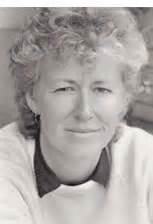A Quote by May Sarton
Joy, happiness ... we do not question. They are beyond question, maybe. A matter of being. But pain forces us to think, and to make connections ... to discover what has been happening to cause it. And, curiously enough, pain draws us to other human beings in a significant way, whereas joy or happiness to some extent, isolates.
Related Quotes
The difference between shallow happiness and a deep, sustaining joy is sorrow. Happiness lives where sorrow is not. When sorrow arrives, happiness dies. It can't stand pain. Joy, on the other hand, rises from sorrow and therefore can withstand all grief. Joy, by the grace of God, is the transfiguration of suffering into endurance, and of endurance into character, and of character into hope--and the hope that has become our joy does not (as happiness must for those who depend up on it) disappoint us.
I've known great happiness in my life along with great darkness, and a question that has repeatedly entered my poetry has been, how do we use the direct experience of happiness that may be given us, whether of love and sexuality or creativity or the sense of connectedness with other beings, human and otherwise?
The fact is that writing, like any creative undertaking, carries with it both pain and great joy. The pain is often inherent in the most fertile subject matter; the joy lies in transforming that subject matter and thus moving through it in a way that helps us grow while we create something of value to others.
Lack of understanding of the true nature of happiness, it seems to me, is the principal reason why people inflict sufferings on others. They think either that the other's pain may somehow be a cause of happiness for themselves or that their own happiness is more important, regardless of what pain it may cause. But this is shortsighted. No one truly benefits from causing harm to another sentient being. . . . . In the long run causing others misery and infringing their rights to peace and happiness result in anxiety, fear, and suspicion within oneself.
The Holy Spirit gives us joy. And he is joy. Joy is the gift in which all the other gifts are included. It is the expression of happiness, of being in harmony with ourselves, that which can only come from being in harmony with God and with his creation. It belongs to the nature of joy to be radiant; it must communicate itself. The missionary spirit of the Church is none other than the impulse to communicate the joy which has been given.
Joy is what we are, not what we must get. Joy is the realization that all we want or need in life has been etched into our souls. Joy helps us see not what we are "going through," but what we are "growing to"-a greater sense of understanding, accomplishment, and enlightenment. Joy reveals to us the calm at the end of the storm, the peace that surpasses the momentary happiness of pleasure. If we keep our minds centered on joy, joy becomes a state of mind.
Why do men learn through pain and suffering, and not through pleasure and happiness? Very simply, because pleasure and happiness accustom one to satisfaction with the things given in this world, whereas pain and suffering drive one to seek a more profound happiness beyond the limitations of this world.






































